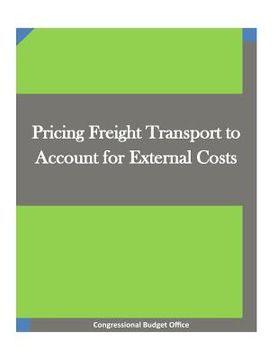Reseña del libro "Pricing Freight Transport to Account for External Costs (en Inglés)"
Freight transport plays a key role in the economy. Over the past several decades, as the U.S. economy and the role of international trade have grown, freight shipping activity has increased substantially. That activity has been accompanied by a considerable amount of public and private spending on the highway and rail infrastructure that supports it. The economic returns from such investments depend on the public and private value of the activities they support, including freight transport. The returns will be higher to the extent that investments are based on accurate information about value. For freight transport, information for private investments comes from the prices that freight carriers receive and the demand for their transport services at those prices. But because freight-transport prices largely do not reflect the external (or social) costs of those services-including pavement damage, traffic congestion, accident risk, and exhaust emissions of particulate matter (PM) and carbon dioxide (CO2)-those prices convey inaccurate information about public value. In particular, the external costs of transport by truck and by rail differ markedly.1 Thus, their market shares, and the size of the market, differ from what they would be if prices reflected external costs more accurately: More freight is shipped, and more is shipped by truck, than would otherwise occur. As a result, more time is lost to highway congestion, and more resources are devoted to building and maintaining highway capacity and to alleviating the effects of diesel emissions and accidents, than if shippers paid their share of those external costs. Taxing freight transport on the basis of external costs would cause shippers to "internalize" those costs. The untaxed external costs of truck transport tend to be much higher, per ton-mile, than those of rail transport, even after accounting for the taxes that freight carriers already pay. Taxes that more fully reflected external costs would cause some freight to shift from truck to rail. Because truck and rail are not perfect substitutes, the shift would probably be modest. But it would reduce external costs and allocate resources more efficiently, and the tax revenue could be used to lower other taxes, reduce the deficit, or increase spending for the nation's public transport infrastructure or for other purposes. This paper provides estimates of the effects of a variety of such taxes. Using a simulation model based on observed overland shipping activity in the United States, the analysis shows how each tax would affect shippers' choice of transport mode and the amounts of carload/truckload, bulk, intermodal freight (which travels by truck and rail), and automobiles that would be shipped. The model's predictions are based on estimates of shippers' sensitivity to changes in transport prices and of goods-producers' sensitivity to changes in commodity prices as the cost of transporting those commodities changes. This paper provides estimates of changes in the number of freight-haul trips, external costs, total fuel savings, and the tax revenue from each policy. The options examined here range from a tax on all external costs to more easily administered extensions of existing taxes that would only partially internalize those costs.

